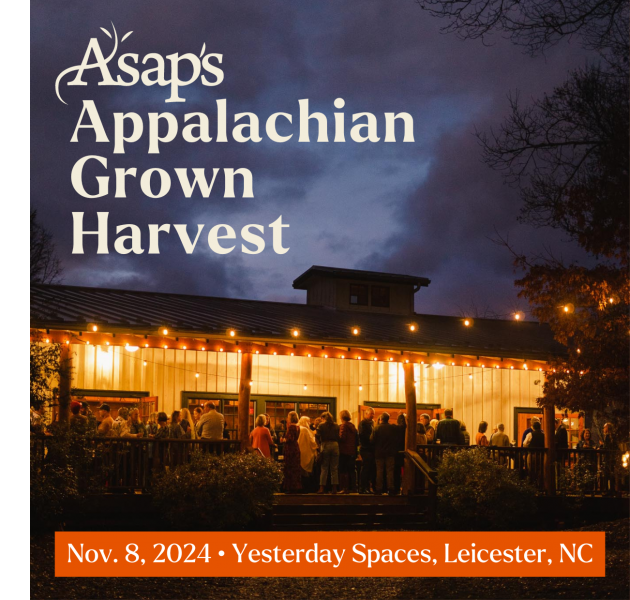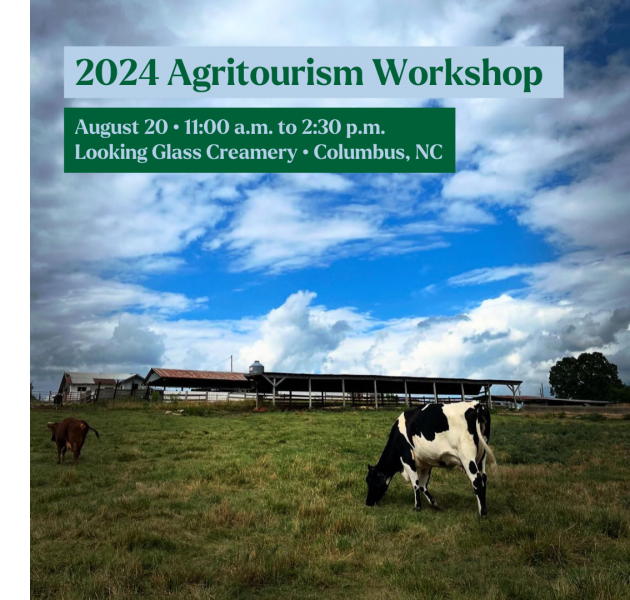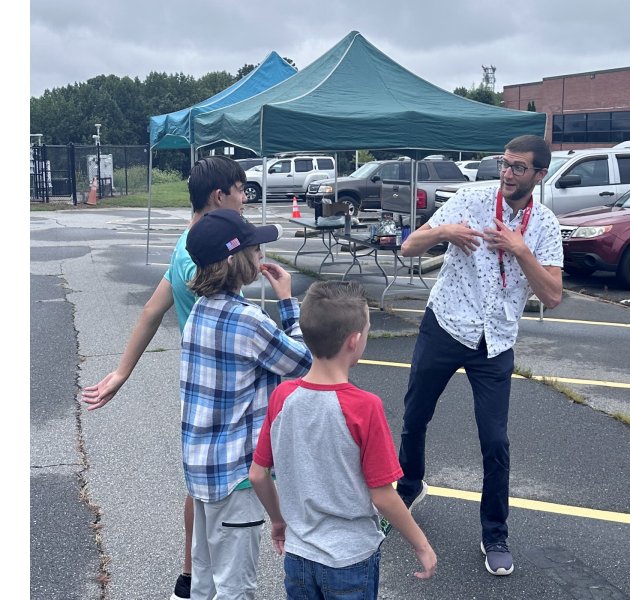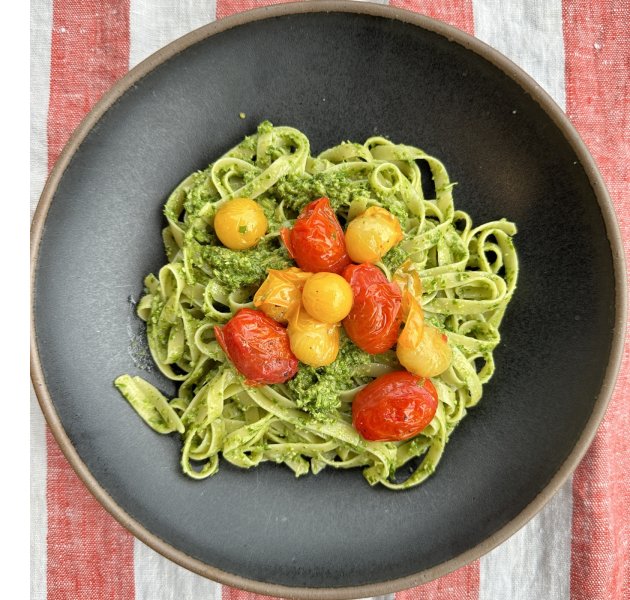|
|
|
monthly news from ASAP | JULY 2024 | asapconnections.org
|
| |
|
|
Farms Announced for the Farm Tour, Sept. 21-22
|
21 farms will participate in ASAP's 2024 Farm Tour, taking place Saturday and Sunday, Sept. 21–22, noon to 5 p.m. These farms, including nine new to the tour in 2024, represent some of the amazing diversity of agriculture happening in our region. Pick your own fruit or flowers, feed friendly farm animals, learn about regenerative agriculture, sample locally made cheese and beverages, and much more! Farms are organized by cluster to help you plan and maximize your time on the farm. Spanish-language tours will be offered at three farms. The Farm Tour is appropriate for attendees of all ages and abilities. Learn more about what each farm will offer on the tour and use our Farm Tour map to start planning your weekend. Free Farm Tour guides will be available to pick up in mid August. Advance passes ($35, good for all passengers in your vehicle) are on sale now. You can also sign up to volunteer for one day of the tour and tour for free the day you aren't working.
|
|
 |
Save the Date: Appalachian Grown Harvest
|
 ASAP has been creating connections between our region’s farmers, restaurants, and community for more than 20 years. We are celebrating the end of the harvest season by coming together at the table on Nov. 8 at Yesterday Spaces in Leicester, NC. The Appalachian Grown Harvest dinner will be served small-plate style with the opportunity to chat with the farmers and chefs that grew and created each dish! Look for announcements of participating chefs in early fall. ASAP has been creating connections between our region’s farmers, restaurants, and community for more than 20 years. We are celebrating the end of the harvest season by coming together at the table on Nov. 8 at Yesterday Spaces in Leicester, NC. The Appalachian Grown Harvest dinner will be served small-plate style with the opportunity to chat with the farmers and chefs that grew and created each dish! Look for announcements of participating chefs in early fall.
Tickets for this fundraiser are available individually or by tables of 8. Find out more and purchase tickets here. Please contact Nora Scheff ([email protected]) with any questions regarding this event.
|
|
 |
Agritourism Workshop on Aug. 20 at Looking Glass Creamery
|
 ASAP's 2024 Agritourism Workshop for farmers will take place Tuesday, Aug. 20, 11 a.m. to 2:30 pm. at Looking Glass Creamery in Polk County. Registration is $15, with discounts for farm partners registering together. Find out more and register here! ASAP's 2024 Agritourism Workshop for farmers will take place Tuesday, Aug. 20, 11 a.m. to 2:30 pm. at Looking Glass Creamery in Polk County. Registration is $15, with discounts for farm partners registering together. Find out more and register here!
This workshop connects farmers with professionals in the region to learn more about challenges and opportunities, legal and insurance considerations, and strategies for improving and expanding your farm business’s agritourism offerings.
Speakers include David Smiley from ASAP, Bill
Durr from Ward & Smith, P.A., Wes Johnson from
Johnson Insurance, and Jennifer and Andy Perkins
of Looking Glass Creamery.
|
|
 |
 A big welcome to Kelsie Rothwell, ASAP's new Local Food Campaign Program Coordinator! You may recognize Kelsie from her internship with ASAP last summer through the SECU Public Fellows program. She graduated this past spring from University of North Carolina Asheville with a Environmental Studies degree with concentration in Environmental Management and Policy. We're thrilled to have her back at ASAP as a staff member!
As part of the Local Food Campaign team, Kelsie will assist with ASAP's programs and services for farmers, including farmer workshops and the Business of Farming Conference, Appalachian Grown branding program, Local Food Guide, and other support. |
|
 |
 FACES OF LOCAL FACES OF LOCAL |
| |  William Yates is an AIG (Academically or Intellectually Gifted) teacher at Waynesville Middle School. He spent three weeks this summer embedded in ASAP’s programs as part of the 2024–25 Kenan Fellows Program for Teacher Leadership. The fellowship connects outstanding educators with mentors, creating opportunities and relationships to help students understand how STEM concepts apply in the real world. Danielle Raucheisen, ASAP’s Growing Minds Program Director, is serving as Williams’s mentor for the 2024–25 school year. William Yates is an AIG (Academically or Intellectually Gifted) teacher at Waynesville Middle School. He spent three weeks this summer embedded in ASAP’s programs as part of the 2024–25 Kenan Fellows Program for Teacher Leadership. The fellowship connects outstanding educators with mentors, creating opportunities and relationships to help students understand how STEM concepts apply in the real world. Danielle Raucheisen, ASAP’s Growing Minds Program Director, is serving as Williams’s mentor for the 2024–25 school year.
What do you teach at Waynesville Middle School?
This year will be my 11th year. For my first three years I taught seventh grade English. For the past eight I’ve been the AIG teacher for all grade levels—sixth, seventh, and eighth. I teach seven classes a day, including one special class that I sought permission for three years ago. That’s a hands-on, project-based class focused on servant leadership. I’m passionate about kids having a chance to emerge as leaders, grow those soft skills, and make change in their community. I really like trying to get our learning to go beyond the walls of the school.
For example, this past year we did a unit on the Town of Waynesville and how societies work. Students researched county and town government roles and then campaigned [to the class] to be elected to those roles. They learned the parameters for their department and developed ideas for improvement. They held a town hall meeting and created press conference videos. We mailed them to the current leaders in those positions, and about 75 percent responded!
What were some of your favorite experiences while at ASAP?
The variety of experiences has been spectacular! Everyone here has given me so much. I’ve had great field experiences with Suzi and Debbi [ASAP’s Growing Minds Program Coordinators]. My first day, I got to observe the Growing Minds Sprout Market at Eliada Home. Last week I got to help with the middle schoolers at Ag camp [through Buncombe County Career and Technical Education]. We pickled vegetables.
I went on tours of R Farm and TendWell Farm with David [ASAP Local Food Campaign Program Director], along with representatives from North Carolina Department of Public Instruction. It was really neat to hear those different perspectives, from state nutrition reps, farmers, and ASAP staff. I learned the ins and outs of school food system.
And farmers market experiences! I helped with taste tests and activities at the Weaverville and downtown Asheville markets. I also had a new experience as a shopper at the market in my own community, the Haywood market. It’s making me want to try new things.
Often farm to school work is more integrated with preschool or elementary school children. What are your thoughts about using it with middle school students?
I love middle school. Most people look at me with a critical brow, but I really like that age. There’s a growing maturity to go deeper with things, to actually be able to have critical conversations, but at the same time still the ability to have fun, to be surprised, to lose themselves in what we’re learning. My student teaching was in high school. I felt every day I had to prove myself to these hardened teenagers, who thought I had nothing new to share with them.
In middle school kids start participating in sports and other activities, where what you are eating and putting in your body affects so many things about development and social emotional wellbeing. I want kids to see all the links in the chain—how food gets to you, how healthy food is the not just a choice, but the best choice. I don’t know if that’s always clear. I want to be able to take it from an abstraction to something more concrete.
What’s next?
As part of the Kenan Fellowship, we create a project. I’m developing a unit for for my leadership class curriculum based on food connections. Storytelling is such a key element. With food, stories are tied to our physical health, connected to memory, stories at the community level. There are stories like what’s happening with Southside Community Farm right now, with competing interests over what should be done with the land. Globally, population growth is skyrocketing. How do you feed a population that won’t be decreasing any time soon? I want my students to get a holistic view of thinking about food in its entirety.
|
|
|
|
 RECIPE OF THE MONTH RECIPE OF THE MONTH |
|
Fettuccine with Arugula Pesto and Blistered Cherry Tomatoes
|
|  This summertime recipe comes from Jessica Spiegel of Terra Lingua Growers in South Carolina, which she shared in ASAP's 2024 Local Food Guide."Cherry tomatoes are one of the main summer crops at Terra Lingua," says Jessica. "Our favorite by far is the Sakura, a large, super sweet cherry variety from the greenhouse. Because of its size it is quite versatile and is great cooked and fresh—truly a crowd pleaser. The brightness and tanginess of the Sakura's cuts through the heaviness of the pesto and makes a truly stunning dish." This summertime recipe comes from Jessica Spiegel of Terra Lingua Growers in South Carolina, which she shared in ASAP's 2024 Local Food Guide."Cherry tomatoes are one of the main summer crops at Terra Lingua," says Jessica. "Our favorite by far is the Sakura, a large, super sweet cherry variety from the greenhouse. Because of its size it is quite versatile and is great cooked and fresh—truly a crowd pleaser. The brightness and tanginess of the Sakura's cuts through the heaviness of the pesto and makes a truly stunning dish."
Servings: 4-6
Ingredients
- 3 cups arugula
- 3/4 cup extra virgin olive oil
- 1/2 cup freshly grated parmesan cheese
- 1/2 cup walnuts
- 1 tablespoon lemon juice
- 2 cloves garlic
- 1/4 teaspoon salt
- Freshly ground pepper to taste
- 1 pint cherry tomatoes
- 1 tablespoon olive oil
- 1 pound dried fettuccine noodles
Directions
- For the pesto, combine the first eight ingredients in a food processor and combine until it’s the consistency you want. Scrape down the sides and continue to process as needed. Taste and adjust salt and pepper.
- Cook fettuccine according to package directions. Al dente (with a little bite to it) works best. Drain and return to the pot.
- Heat 1 tablespoon olive oil in a cast iron pan on medium-high heat. Add the tomatoes and cook for 1 minute, until they start to blister. Toss with a pinch of salt and freshly ground pepper.
- Stir the pesto into the pasta. Portion onto plates or wide bowls and top each serving with blistered tomatoes.
Find more recipes at growing-minds.org and asapconnections.org.
|
|
|
|
|
|
|
 MEDIA HIGHLIGHTS MEDIA HIGHLIGHTS |
| | “This work ultimately supports ASAP’s Theory of Change. We believe that although the current food system is harmful, we all have the power to transform it to support the health and wellbeing of our community and environment. Changing the food system requires broad and active participation from all members of the community.”
|
|
|
|
| | |
ASAP's mission is to help local farms thrive, link farmers to markets and supporters, and build healthy communities through connections to local food.
|
|
|
|
|
|
|
|
|
|
|